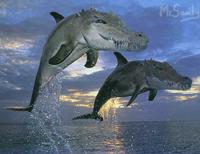Astrology is scientific theory, courtroom told
Astrology is scientific theory, courtroom told
13:30 19 October 2005
NewScientist.com news service
Astrology would be considered a scientific theory if judged by the same criteria used by a well-known advocate of Intelligent Design to justify his claim that ID is science, a landmark US trial heard on Tuesday.
Under cross examination, ID proponent Michael Behe, a biochemist at Lehigh University in Bethlehem, Pennsylvania, admitted his definition of "theory" was so broad it would also include astrology.
The trial is pitting 11 parents from the small town of Dover, Pennsylvania, against their local school board. The board voted to read a statement during a biology class that casts doubt on Darwinian evolution and suggests ID as an alternative.
The parents claim this was an attempt to introduce creationism into the curriculum and that the school board members were motivated by their evangelical Christian beliefs. It is illegal to teach anything with a primarily religious purpose or effect on pupils in government-funded US schools.
Supporters of ID believe that some things in nature are simply too complex to have evolved by natural selection, and therefore must be the work of an intelligent designer.
Peer review
Behe was called to the stand on Monday by the defence, and testified that ID was a scientific theory, and was not "committed" to religion. His cross examination by the plaintiffs’ attorney, Eric Rothschild of the Philadelphia law firm Pepper Hamilton, began on Tuesday afternoon.
Rothschild told the court that the US National Academy of Sciences supplies a definition for what constitutes a scientific theory: “Theory: In science, a well-substantiated explanation of some aspect of the natural world that can incorporate facts, laws, inferences, and tested hypotheses.”
Because ID has been rejected by virtually every scientist and science organisation, and has never once passed the muster of a peer-reviewed journal paper, Behe admitted that the controversial theory would not be included in the NAS definition. "I can’t point to an external community that would agree that this was well substantiated," he said.
Behe said he had come up with his own "broader" definition of a theory, claiming that this more accurately describes the way theories are actually used by scientists. "The word is used a lot more loosely than the NAS defined it," he says.
Hypothesis or theory?
Rothschild suggested that Behe’s definition was so loose that astrology would come under this definition as well. He also pointed out that Behe’s definition of theory was almost identical to the NAS’s definition of a hypothesis. Behe agreed with both assertions.
The exchange prompted laughter from the court, which was packed with local members of the public and the school board.
Behe maintains that ID is science: “Under my definition, scientific theory is a proposed explanation which points to physical data and logical inferences.”
"You've got to admire the guy. It’s Daniel in the lion’s den," says Robert Slade, a local retiree who has been attending the trial because he is interested in science. "But I can’t believe he teaches a college biology class."
The cross examination will continue Wednesday, with the trial expected to finish on 4 November.









<< Home